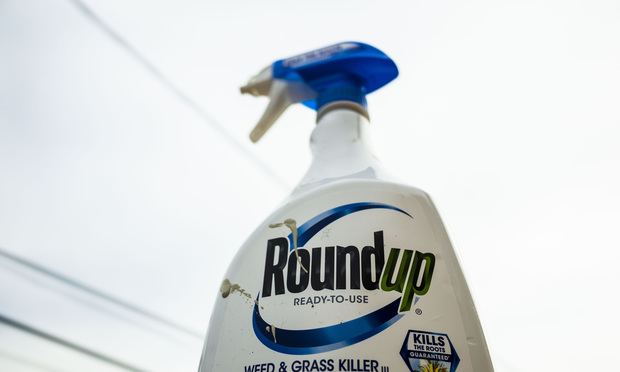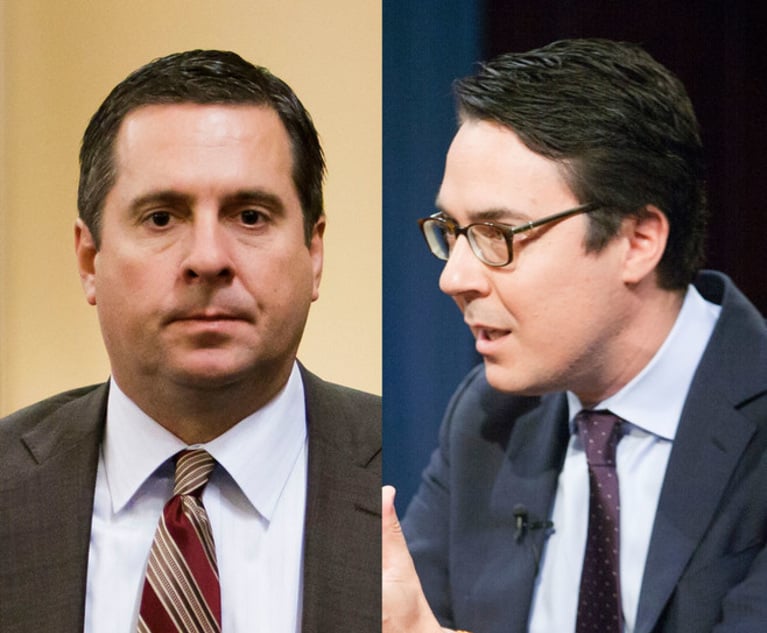Could Federal Preemption Blow Up a $289M Roundup Verdict?
California's First District Court of Appeal ordered additional briefing on Monsanto's defense of federal preemption—an issue that could have wide ramifications for all Roundup lawsuits. California Attorney General Xavier Becerra filed an amicus brief supporting plaintiffs' claims against federal preemption.
February 12, 2020 at 05:48 PM
6 minute read
 Roundup weed killer.
Roundup weed killer.
In an appeal that could have wide-ranging ramifications for thousands of Roundup lawsuits, lawyers on both sides of a $289 million verdict now on appeal filed supplemental briefs Tuesday addressing whether federal law preempted claims that Monsanto Co. failed to warn about its herbicide's health risks.
The supplemental briefs, which also included an amicus brief, filed by California Attorney General Xavier Becerra, come in the appeal of a $289 million verdict in 2018 to plaintiff Dewayne Lee Johnson, who alleged Roundup caused his non-Hodgkin lymphoma. California's First District Court of Appeal, which has indicated that it could set oral argument for March or April, asked both sides to file supplemental briefs responding to three questions that addressed whether the U.S. Supreme Court's decisions on federal preemption, such as Wyeth v. Levine, applied to Roundup.
Monsanto, now owned by Bayer AG, insisted in its brief that, under Wyeth, there was "clear evidence" the EPA would not have allowed it to change Roundup's label to warn of cancer risks.
"Plaintiff's state-law failure-to-warn claims are preempted because there is 'clear evidence' that EPA, having been fully informed, would have rejected Monsanto's request to add the label warning that state law here purportedly requires," wrote David Axelrad, of Burbank, California's Horvitz & Levy, along with attorneys at Bryan Cave Leighton Paisner. As a result, he wrote, "it would be 'impossible' for Monsanto to comply with both federal law and the state-law duty to warn theory on which the verdict rests."
Plaintiffs attorney Curtis Hoke, in a separate brief, said that no such "clear evidence" existed.
"It never asked for a label change, it withheld key data, it failed to test its product, and it marshalled enormous resources and influence to prevent a label change," Hoke, of the Miller Firm in Orange, Virginia, wrote about Monsanto. "The EPA has also never formally rejected a request to add a cancer warning to a Roundup label on the basis that NHL is a potential risk of Roundup."
The Johnson verdict, later reduced to $78.5 million, was the first of three against Monsanto, which faces 42,700 lawsuits over Roundup. Juries last year awarded verdicts of $2 billion and $80 million. Bayer has raised federal preemption in all three appeals. In the $80 million verdict, Bayer filed its brief on Dec. 13 before the U.S. Court of Appeals for the Ninth Circuit, and, in the $2 billion award, before the First District Court of Appeal on Feb. 7.
On Jan. 21, the First District Court of Appeal, citing recent affirmations by the EPA on the safety of Roundup ingredient glyphosate, and the U.S. Supreme Court's preemption holdings in Merck Sharp & Dohme v. Albrecht and Wyeth v. Levine, asked lawyers to answer three questions:
- Should Wyeth be extended to the FIFRA [Federal Insecticide, Fungicide, and Rodenticide Act], such that a court should determine whether there is clear evidence the EPA would not have approved a change to the labels of Monsanto's glyphosate-based products?
- Assuming that Wyeth applies, is this a determination that should be made by this court in the first instance or on remand in the trial court? And whichever court makes the determination, how should it be made?
- If a court were to determine that FIFRA preempts Johnson's failure-to-warn causes of action under Wyeth, but not Johnson's design-defect cause of action, what effect, if any, would that have on the jury's verdict?
In its supplemental brief, Bayer argued that Wyeth's "impossibility" standard governed the case, that the First District Court of Appeal should decide for preemption and order a new trial given that other claims of defective design were intertwined with failure-to-warn allegations. Bayer's brief relied on the EPA's position since 1991, most recently reaffirmed last month, that glyphosate does not cause cancer.
"EPA's approval of a label in the course of registering a product compels the use of that approved label, without deviation," Axelrad wrote. "Monsanto could not lawfully add a cancer warning to Roundup's label at all without prior EPA approval."
Additionally, he wrote, Wyeth, which involved a prescription drug, addressed "longstanding preemption principles" that are not limited to the Food, Drug, and Cosmetic Act.
"This court should thus apply the 'clear evidence' standard to determine whether federal law prohibits a pesticide manufacturer from adding a warning required by state law, just as the Supreme Court applied the standard when determining whether federal law prohibited a drug manufacturer from adding a warning required by state law," Axelrad wrote.
Johnson's lawyers, who also include those at Los Angeles-based Baum, Hedlund, Aristei & Goldman and San Francisco's Audet & Partners, wrote that the First District Court of Appeal should decide against federal preemption issue but, should it side with Bayer, exclude design defect claims, which are about the design of the product and not the labeling.
The verdict, Hoke wrote, should stand.
Moreover, unlike the statute at issue in Wyeth and Merck, FIFRA did not preempt the claims in Roundup, because it "expressly contemplates that states can disallow what EPA permits," he wrote.
"A California jury can therefore find that a product is misbranded under FIFRA even where the EPA does not," Hoke wrote. "This court should decline Monsanto's request to create a new rule that would bestow blanket immunity upon manufacturers of registered pesticides."
Both Hoke and the state, in its amicus brief, noted that the FIFRA would not preempt failure-to-warn claims for the additional reason that cancer warnings could be on store signs, not Roundup's labels.
The state, in its brief, emphasized its police powers under California's Safe Drinking Water and Toxic Enforcement Act of 1986, or Proposition 65, which classifies glyphosate as carcinogenic.
"The fact is EPA's failure to regulate glyphosate doesn't excuse Monsanto from liability or preempt California from requiring that consumers be informed of the risks of cancer-causing products," Becerra said in a statement on Wednesday. "California protects its residents from dangerous pesticides, and we shouldn't be forced to put our heads in the sand simply because the EPA won't do its job."
This content has been archived. It is available through our partners, LexisNexis® and Bloomberg Law.
To view this content, please continue to their sites.
Not a Lexis Subscriber?
Subscribe Now
Not a Bloomberg Law Subscriber?
Subscribe Now
NOT FOR REPRINT
© 2025 ALM Global, LLC, All Rights Reserved. Request academic re-use from www.copyright.com. All other uses, submit a request to [email protected]. For more information visit Asset & Logo Licensing.
You Might Like
View All
Devin Nunes, Former California GOP Congressman, Loses Move to Revive Defamation Suit
6 minute read
'Close Our Borders?' Senate Judiciary Committee Examines Economics, Legal Predicate for Mass Deportation Proposal
3 minute read
A Judge Asks: Is It Time to End Ken Feinberg's Roundup Settlement Program?
7 minute read
Law Firms Mentioned
Trending Stories
- 1Uber Files RICO Suit Against Plaintiff-Side Firms Alleging Fraudulent Injury Claims
- 2The Law Firm Disrupted: Scrutinizing the Elephant More Than the Mouse
- 3Inherent Diminished Value Damages Unavailable to 3rd-Party Claimants, Court Says
- 4Pa. Defense Firm Sued by Client Over Ex-Eagles Player's $43.5M Med Mal Win
- 5Losses Mount at Morris Manning, but Departing Ex-Chair Stays Bullish About His Old Firm's Future
Who Got The Work
J. Brugh Lower of Gibbons has entered an appearance for industrial equipment supplier Devco Corporation in a pending trademark infringement lawsuit. The suit, accusing the defendant of selling knock-off Graco products, was filed Dec. 18 in New Jersey District Court by Rivkin Radler on behalf of Graco Inc. and Graco Minnesota. The case, assigned to U.S. District Judge Zahid N. Quraishi, is 3:24-cv-11294, Graco Inc. et al v. Devco Corporation.
Who Got The Work
Rebecca Maller-Stein and Kent A. Yalowitz of Arnold & Porter Kaye Scholer have entered their appearances for Hanaco Venture Capital and its executives, Lior Prosor and David Frankel, in a pending securities lawsuit. The action, filed on Dec. 24 in New York Southern District Court by Zell, Aron & Co. on behalf of Goldeneye Advisors, accuses the defendants of negligently and fraudulently managing the plaintiff's $1 million investment. The case, assigned to U.S. District Judge Vernon S. Broderick, is 1:24-cv-09918, Goldeneye Advisors, LLC v. Hanaco Venture Capital, Ltd. et al.
Who Got The Work
Attorneys from A&O Shearman has stepped in as defense counsel for Toronto-Dominion Bank and other defendants in a pending securities class action. The suit, filed Dec. 11 in New York Southern District Court by Bleichmar Fonti & Auld, accuses the defendants of concealing the bank's 'pervasive' deficiencies in regards to its compliance with the Bank Secrecy Act and the quality of its anti-money laundering controls. The case, assigned to U.S. District Judge Arun Subramanian, is 1:24-cv-09445, Gonzalez v. The Toronto-Dominion Bank et al.
Who Got The Work
Crown Castle International, a Pennsylvania company providing shared communications infrastructure, has turned to Luke D. Wolf of Gordon Rees Scully Mansukhani to fend off a pending breach-of-contract lawsuit. The court action, filed Nov. 25 in Michigan Eastern District Court by Hooper Hathaway PC on behalf of The Town Residences LLC, accuses Crown Castle of failing to transfer approximately $30,000 in utility payments from T-Mobile in breach of a roof-top lease and assignment agreement. The case, assigned to U.S. District Judge Susan K. Declercq, is 2:24-cv-13131, The Town Residences LLC v. T-Mobile US, Inc. et al.
Who Got The Work
Wilfred P. Coronato and Daniel M. Schwartz of McCarter & English have stepped in as defense counsel to Electrolux Home Products Inc. in a pending product liability lawsuit. The court action, filed Nov. 26 in New York Eastern District Court by Poulos Lopiccolo PC and Nagel Rice LLP on behalf of David Stern, alleges that the defendant's refrigerators’ drawers and shelving repeatedly break and fall apart within months after purchase. The case, assigned to U.S. District Judge Joan M. Azrack, is 2:24-cv-08204, Stern v. Electrolux Home Products, Inc.
Featured Firms
Law Offices of Gary Martin Hays & Associates, P.C.
(470) 294-1674
Law Offices of Mark E. Salomone
(857) 444-6468
Smith & Hassler
(713) 739-1250






